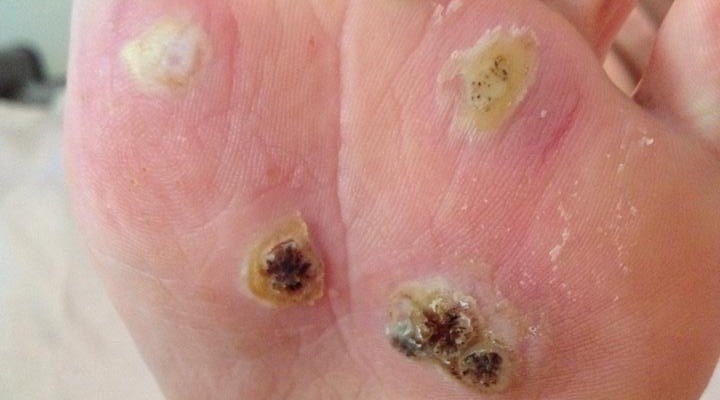Plantar warts are hard, grainy growths that usually appear on the heels or balls of your feet, areas that feel the most pressure.
- Review the patient’s daily regimen and recommend the following: daily soaking of the foot in warm water for 5 to 10 minutes, drying of the area, debridement of hyperkeratotic tissue with an emery board or pumice stone, topical application of salicylic acid, and occlusion by either a bandage or duct tape.
- Inform patients that plantar warts are caused by the human papillomavirus that infects their skin, and resolution of these warts may take months to years.
- Explain to patients that multiple modalities exist for treating plantar warts and management may require a combination before resolution of lesions.
- Educate patients regarding the variety of treatment modalities, and emphasis should be placed on the importance of continuing treatment plans and attending follow-up appointments.
- Encourage patients to wear proper foot coverings like shower shoes or sandals when walking through dirty ground surfaces and to avoid any direct skin contact if possible.
- Discuss proper foot hygiene especially when walking through public restrooms or locker rooms.
- Teach patient to avoid walking barefoot on warm, moist surfaces where the wart virus may be alive. Wear shower shoes when using public showers, locker rooms, or pool areas.
- Any item that has come into contact with a plantar wart (for example, a sock or towel) should be thoroughly cleaned with hot water and soap to prevent transmission.
- Advise patient to avoid touching warts on their self or others.
- Advise patients not to share razors, towels, socks, or shoes with another person. Someone with no visible warts can still be carrying the virus.
- Keep the patient’s feet dry. If the feet sweat heavily, advise them to wear socks that absorb moisture or wick it away from the skin.
- Teach patients to avoid irritating the soles of the feet. Warts grow more easily if your skin has been injured or broken in some way.
- Administer salicylic acid and other medications as ordered.










